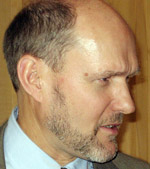– Albania?
– No, Armenia…
– Romania?
– Armenia, Turkey, Russia, Armenia…
After the “traditional” confusion of geographical locations and the corrections began the interview with Harvard University professor and doctor/professor of political science Steven Walt, who is making a special speech entitled “What’s the flaw in U.S. foreign politics and how can we correct it?” Steven Walt is probably one of America’s most famous scientists with a scandalous reputation. According to experts, his article entitled “Israeli lobbying: doesn’t it have too much influence on U.S. foreign politics?” is probably the most discussed article after the “Destruction of Civilizations” work done by Faukuyama. Walt was one of the few who raised the issue of reducing the amount of aid directed towards Israel and the influence of the Israeli community and that caused a lot of commotion. In fact, many large publishing houses refused to print that article.
This report by Walt included U.S. foreign politics in the past five years. This was the five-year analysis of post-September 11.
Walt calls the most evident world process as “democratization of violence”. According to him, 100 years ago, the state alone could have killed 100 people, while today, any extremist group can do the same.
Walt refuses to call the U.S. an empire. In his opinion, the U.S. is built on an empire full of resources from different countries. According to Walt, the U.S. is “simply” a powerful country and its major flaw is Iraq. “America must quickly leave Iraq and fix a deadline. It’s not whether Saddam Hussein had a nuclear weapon or not; he could have had one. After the quick victory in Afghanistan, we thought that it would be the same in Iraq. Things didn’t go as planned. We have already spent 100 billion dollars, not counting the loss of human resources. The U.S. has to get back its credit after the Iraq war. We must negotiate with Iraq. Apparently, the U.S. has done everything for Ahmadinejad, it has raised the issue of the nuclear power and has started a new wave for nationalism. We simply had to tell Iran that we allow them to have a nuclear weapon, but what if your neighboring countries have one too? Does that mean arming all the countries?”
Steven Walt, who is considered to be a liberal internationalist, believes that the time has come to ameliorate the relations with the Middle East and lead stricter politics with Israel. Today, mega-medias of America have lost their monopolistic position. That’s why “America needs strategists, scientists, who can speak Arabic, go on “Al-Jazira” television and explain their goals,” says Steven Walt.
Walt calls the new method of starting relations with the world as individual, from the regional level to the interstate, even internal.
Interview with S. Walt
– Does the U.S. pay attention to the Southern Caucasus when leading foreign politics?
– America doesn’t place the Southern Caucasus among global issues
– But after all, two presidents of the Southern Caucasus region visited Washington this year and it’s quite possible that the President of Armenia will also pay a visit. If the Caucasus wasn’t on the agenda, would there be more visits by both sides?
– I have been in Georgia two times. The first time was back in the mid-80s at a time when nobody believed in Gorbachev’s “perestroika” and “glasnost”. I made the second visit in the end of the 90s. The U.S. has just recently started paying attention to the Southern Caucasus because of the oil pipeline. Until the construction of the pipeline, the U.S. has simply provided humanitarian aid to the regional countries. The U.S. helps Armenia by donating 30 dollars to each Armenian citizen, while it donates 1.5 dollars to Georgians and Azeri. Why? Is it because Armenia is more democratic than the other two and human rights are respected? No. I know how Armenian lobbying works and America has provided aid through the means of that lobbying. Will the oil pipeline change the relations between America and the region? I think it would be better to ask Europeans because the oil is going to flow through Europe. So, for the time being, the Southern Caucasus is not in the interest of the U.S.

